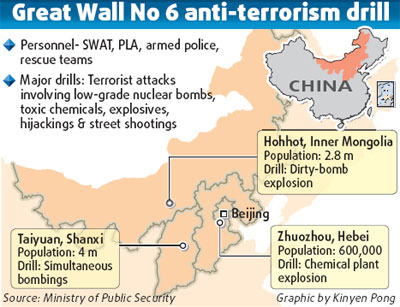Security for the nation's 60th anniversary celebrations is set to be tighter than during the Beijing Olympics with a massive anti-terrorism drill launched Tuesday in regions around the capital.
Anti-terror drills combating mock attacks from low-grade nuclear weapons and toxic chemicals as well as simulated hijackings and street shooting, are expected to cost millions of yuan and involve thousands of SWAT police and soldiers.

Security experts said the scale of the operations shows that the security level for the Oct 1 event will be even higher than the Games last summer.
The unprecedented measures follow a series of suspected terrorist attacks and incidents around the nation.
Major cities have recently raised their security alerts in the wake of a bus fire last Friday in Chengdu, which claimed 27 lives and injured dozens. Police have not ruled out terrorist involvement in the incident.
In neighboring Chongqing, security forces are hunting for a man who killed a soldier before snatching his gun in March.
Threats to the capital and neighboring regions have been growing, and terror organizations and separatist groups, such as the East Turkistan Islamic Movement, have warned of attacks, anti-terror specialists said.
The potential targets appear to be politically-sensitive sites, rather than venues of international interest targeted during the Olympics, said Li Wei, director of the Counter-Terrorism Studies Center at the China Institutes of Contemporary International Relations.
"But their ambition of hitting high-profile targets has not diminished," he said.
Bomb specialists, armed forces and medical teams were sent to the site of a "dirty bomb" explosion Tuesday in Inner Mongolia's Hohhot.
The rest of the week-long drills will be held in various locations including Shanxi and Hebei.
Elite armed forces, including the Snow Leopard Commandos, feature in the drills, which end next week.
More such drills are likely to be staged in and around major cities nationwide in the run-up to Oct 1, analysts said Tuesday.
The capital is the core target for terrorists, but they may try to get around the tight defense and choose less guarded areas, said Professor Wang Taiyuan, a security researcher with the University of Public Security.
The media will have the opportunity to observe the drills, Great Wall No 6, in Shanxi province from tomorrow, said the Ministry of Public Security, which has been in charge of organizing the annual exercise which started in 2003.
An anti-terrorist force of nearly 100,000 commandos, police and army troops were deployed for security during the two-month Olympics and Paralympics last year. But police failed to stop two heavily armed men from attacking a checkpoint in the border city of Kashgar in Xinjiang, killing 17 and injuring 15 on the eve of the Games.
Security experts also ruled out some entry restrictions for foreign visitors in force during the Olympics.
"The emergency, defensive measures are unlikely to be repeated, since the potential attackers are from a much smaller scope of origin," said Li Wei.
(China Daily?June 10, 2009)